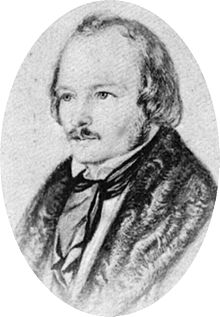This article needs additional citations for verification. (February 2011) |
You can help expand this article with text translated from the corresponding article in German. (February 2011) Click [show] for important translation instructions.
|
Friedrich Wilhelm Schulz | |
|---|---|
 Wilhelm Schulz c. 1820 - pencil drawing by an unknown artist | |
| Born | 13 March 1797 |
| Died | 9 January 1860 (aged 62) Hottingen, Switzerland |
| Nationality | German |
| Occupation(s) | Officer, radical, and socialist publisher |
Friedrich Wilhelm Schulz (often known as Wilhelm Schulz or after his second marriage Wilhelm Schulz-Bodmer; 13 March 1797 in Darmstadt – 9 January 1860 in Hottingen) was a German officer, political writer and radical liberal[1] publisher in Hesse. His most famous works are Der Tod des Pfarrers Friedrich Ludwig Weidig (The Death of Pastor Friedrich Ludwig Weidig.) as well as Die Bewegung der Produktion (Movement of Production), which Karl Marx quoted extensively in his 1844 Manuscripts.[2][3] Schulz was the first to describe the movement of society "as flowing from the contradiction between the forces of production and the mode of production," which would later form the basis of historical materialism.[2] Marx continued to praise Schulz's work decades later when writing Das Kapital.[3]
- ^ Crisis and Renewal in the History of European Political Thought. Brill. 30 August 2021. ISBN 978-90-04-46687-6.
- ^ a b Levine, Norman (2006). Divergent Paths: The Hegelian foundations of Marx's method. Lexington Books. p. 223.
- ^ a b Sperber, Jonathan (2013). Karl Marx: A Nineteenth-Century Life. W. W. Norton & Company. p. 144.